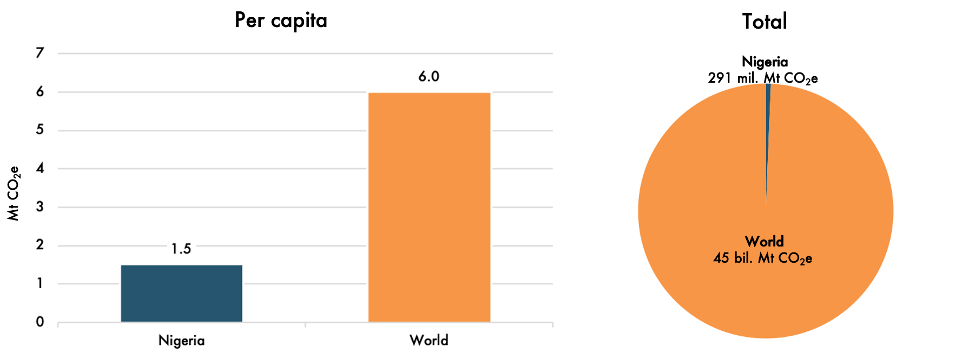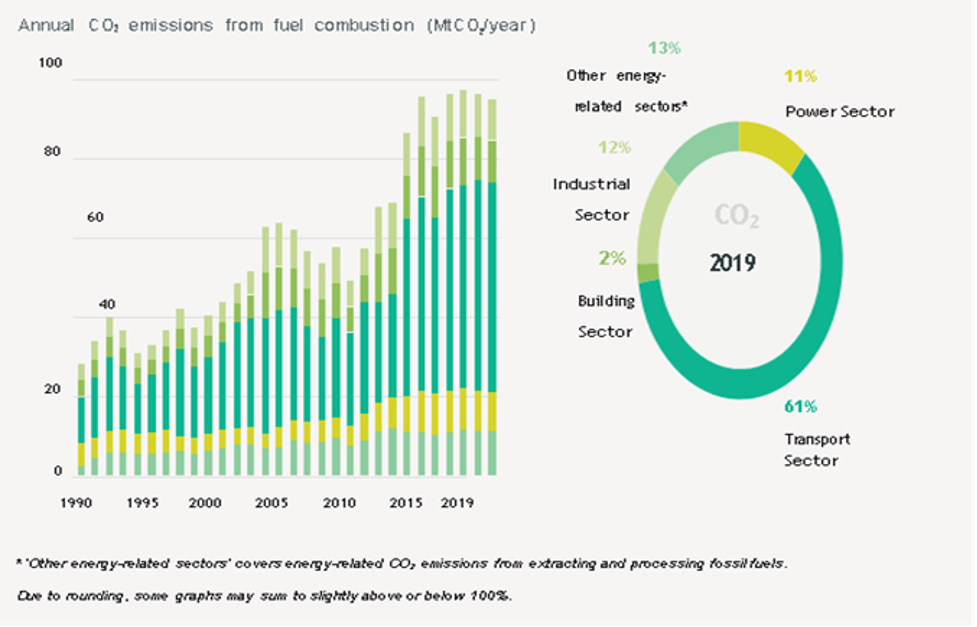What does the global race to ‘net-zero’ mean for Nigeria?
The energy transition challenge facing African countries is both daunting and unique — prompting debate over what the race to ‘net-zero’ will mean for them. Per capita energy consumption across Africa is generally low, but must increase rapidly to accommodate population growth and power economic expansion. African countries have opportunities to minimize the high-carbon choices made by more advanced economies, but clean energy investment is lagging. While emerging economies account for two-thirds of the world’s population, they attract only one-fifth of investments in clean energy.
Nigeria’s energy mix and emissions profile
Nigeria is a globally recognized energy giant, richly endowed with oil and gas reserves — but over a third of the population lacks access to electricity. Grid-tied electricity generation is largely thermal-based, with about 80% of power capacity fueled by gas.1 In 2018, approximately 18% of electricity came from hydropower, the largest source of low-carbon energy in Nigeria’s power mix. Non-hydro renewables currently play a small role, mostly in rural areas with limited access to the grid.
Nigeria’s emissions (excluding those from land use) increased by 11% between 1990 – 2017.2 In 2015, the country was the world’s 17th highest greenhouse gas (GHG) emitter, and Africa’s secondhighest.3 Per capita emissions in 2017 were 1.52 tonnes of CO2 e.4
FIGURE 1: Comparing Nigeria’s 2017 emissions to the rest of the world

Source: World Bank Development Indicators, 2017.
FIGURE 2: Nigeria’s 2019 emissions by sector

Source: Enerdata5
Nigeria is also Africa’s most populous nation, and is expected to become the world’s third most populous country by 2050. A growing population and rising incomes will likely push energy usage higher, and increase GHGs.
Ongoing efforts to reduce emissions
Despite Nigeria’s negligible per capita contribution to global GHG, the country is undertaking several emission reduction measures. Under the Paris Agreement, Nigeria pledged to reduce GHG by 20% from business-as-usual projections in 2030, and by 45% conditional to international support. To date:
- In 2020, the government launched the ‘Solar Power Naija Initiative’ to deploy solar home systems to 5 million households by 2023.
- Through the ‘Nigerian Electrification Project,’ the Rural Electrification Agency has deployed 497kW through mini-grids and 71,737kW through solar home systems.
- The private sector and several state governments are developing business models for electric vehicles and evaluating market readiness.
- In 2016, the federal government launched the Nigerian Gas Flare Commercialization Programme. As of June 2021, the program has awarded 45 licenses to commercialize gas that would otherwise be flared.
- In 2020, the federal government established the National Gas Expansion Programme to reduce vehicle emissions and improve clean cooking.
Recommendations
The pace at which the country moves toward net-zero remains under debate, especially with the National Assembly’s recent passage of the Petroleum Industry Bill and subsequent assent by the President culminating in the promulgation of the Petroleum Industry Act, 2021. The Act does not propose an outlook on renewable energy development or address the global energy transition.
Nigeria will need to scale up climate action to align with the Paris Agreement. Although the country lacks concrete policies regarding emissions mitigation, its recent initiatives are a commendable step in the right direction. In addition, Nigeria should:
- Implement a climate mitigation policy framework, either by amending existing laws or introducing new climate-specific policy.
- Adopt a fair and balanced energy policy approach that diverts revenues generated from fossil fuel investments towards investments in cleaner energy, which over time may outweigh fossil fuel dependence.
Success for Nigeria, and African countries more generally, in achieving net-zero, will depend on 3 key factors:
- Maximizing existing clean energy options;
- Innovation in advanced technology; and
- Reducing fossil fuels while recognizing natural gas as a cleaner transition fuel in areas where cleaner energy cannot be deployed on the scale required.
Ultimately, every country must choose its own energy path based on its specific needs and resources, and the international community must ensure that all countries have the support they need to move forward. The energy transition must be inclusive, equitable and just to secure a clean energy future.
Endnotes
- T. Oyewunmi, I. Ehanmo ‘Energy Law and Regulation in Nigeria- Prospects for Reliable Electricity Supply’ in T. Oyewunmi, P.Crossley, F. G. Sourgens, K. Talus ‘Decarbonisation and the Energy Industry- Law, Policy and Regulation in Low-Carbon Energy Markets’ Hart Publishing (November 2020).
- Federal Ministry of Environment. (2020). Third National Communication (TNC) of the Federal Republic of Nigeria. https://unfccc.int/documents/226453.
- Carbon Brief. August 2020. ‘The Carbon Brief Profile: Nigeria.’ https://www.carbonbrief.org/the-carbon-brief-profile-nigeria
- Climate Transparency. 2020. ‘Climate Transparency Report: Nigeria.’ https://www.climate-transparency.org/wp-content/uploads/2021/01/Nigeria-CT-2020.pdf.
- Enerdata 2020 at https://www.enerdata.net/.
